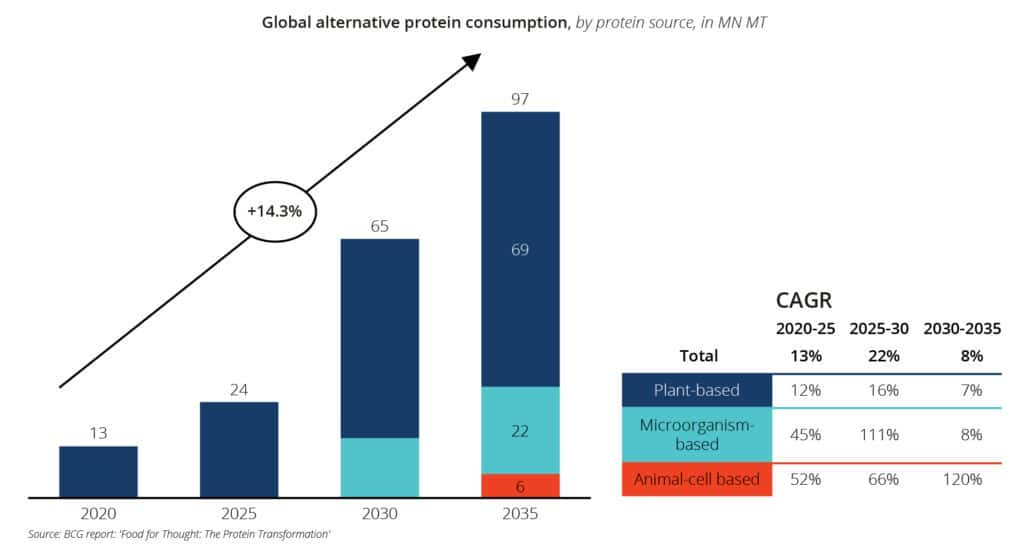The goal of alternative proteins is twofold: to restore the protein disbalance in several countries, and to prevent this disbalance in other countries. The needs for sufficient proteins for future generations, as well as food safety and security for all, requires us to look beyond the traditional market of animal-based meats and dairy. Furthermore, the recently published IPCC report strongly underlines the importance of exploring non-animal-based products (or so-called ‘meat successors’).
Meat successors globally
The global market for alternative proteins is growing steadily. The market used to grow at approximately 5% per year, with most customers being vegetarians and vegans. The launch of Beyond Meat (2012) and Impossible Burger (2016) completely changed the market by no longer targeting vegetarians and vegans, but meat eaters looking for a meat-like alternative.
The global meat market is the largest food market, twice the size of the dairy market. Alternative proteins make up a mere 2% of the meat market, with a global consumption of 13 million metric tonnes (MT) of alternative proteins in 2020. The dairy industry has seen a similar increase in the share of alternative proteins, now 14% of the total dairy market.
The total size of the alternative proteins market in the Netherlands has grown from EUR 114.9 million in 2018 to EUR 180.5 million in 2020.
Recent developments
- Avril (France) and ingredient supplier DSM (NL) announced a collaboration to produce plant protein. Production is set to start in 2022, with an initial focus on canola protein.
- The COVID-19 pandemic has spread global awareness of the impact of food on health and the environment. In the first seven months of 2020, the global market for alternative proteins grew by 129%.
- Unilever purchased the Vegetarian Butcher in December 2018, for an undisclosed amount. Under Unilever, the Vegetarian Butcher reported a 70% increase in revenue in 2020.
- Pepsico and Beyond Meat established their joint venture, The PLANeT Partnership, LLC in January 2021, to develop, produce and market innovative snacks and beverages made from plant-based protein.
- Major developments in research and development include the validation of a method to improve mimicking the texture and bite of conventional meat for non-animal-based products (The Netherlands Organisation for Applied Scientific Research).
- A non-animal-based alternative has been developed alongside the most frequently used dietary advice in the Netherlands (‘Schijf van Vijf’ from the Netherlands Nutrition Centre now knows a ‘vegan’ alternative, known as the ‘Vegan Schijf’).
Forecasts
By 2035, the share of alternatives in the meat, dairy, egg and seafood market is estimated between 10 and 22%, depending on technological advancements and the supportiveness of consumers. Consumption is expected to increase to more than seven times, leading to 97 million MT in 2035, to an estimated market of USD 290 billion. The European, American, and Chinese market are considered the largest markets.
Traditional and novel meat and dairy producers
Although ‘meat/dairy substitutes’ is the most commonly used term, ‘meat/dairy successors’ is actually a better description. After all, we are looking to restore disbalance in protein consumption.
The Netherlands has been a ‘protein country’ for more than 150 years. As experts in this field of agrifood, the country’s skillset includes protein production, innovation, technology, and logistics. Combining these valuable experiences with the innovative expertise will allow the Netherlands to move into a new phase, whereby animal-based proteins and plant-based proteins are not seen as competition. To restore the balance, it is necessary to switch the consumer mindset from seeing meat as the norm and plants as the ‘alternative’, to perceiving plants as an equal to meat.
It is time to invite the ‘unusual suspects’ to the table when discussing the future of proteins. There are more and more examples of traditional meat producers looking into non-animal-based products: Vion with the ME-AT division, JBS with Vivera, even Unilever with The Vegetarian Butcher. It is important to discuss and shape the role for each of these parties (be it traditional or novel) in the new Dutch protein system.
Larive International and meat successors
On behalf of Oost NL, RVO, Topsector Agri & Food, Foodvalley NL, and NFIA, Larive International is conducting a sector study on the Dutch ecosystem of alternative proteins. The goal is to map the Dutch sector and its international ambitions, focusing on trade, innovations, and foreign direct investments.
In the alternative protein sector Larive has worked and is working with various Dutch and international SME’s and multinationals, including Agrifirm, Codrico, Danone, DSM, Heinz, InsectiPro, Mavitec, Nisus Food, Schouten Europe and Zwanenberg.
For companies or individuals interested in learning more about this study or sector, please contact [email protected].
